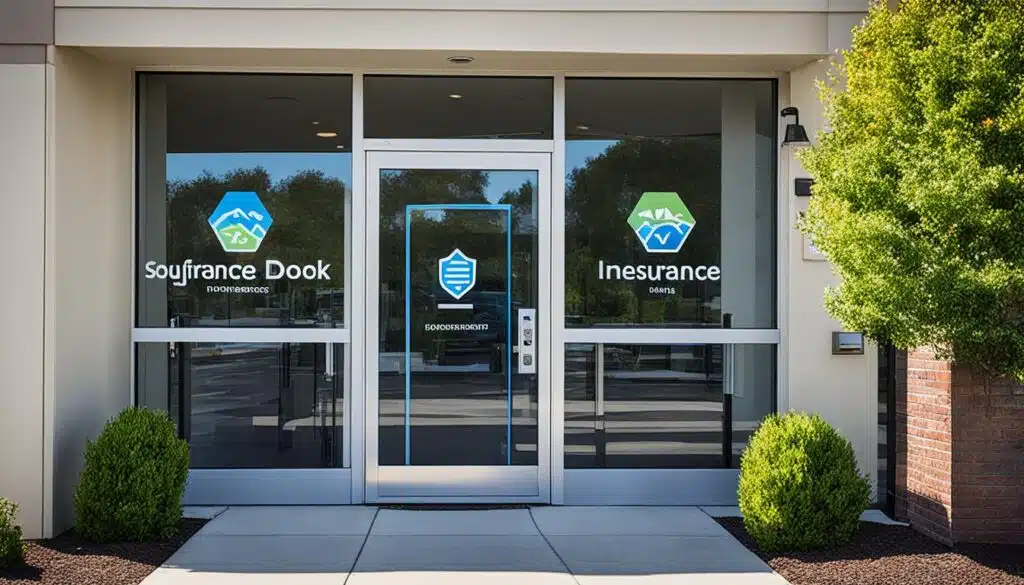As a property owner, safeguarding your rental investments is crucial. That’s why comprehensive property insurance solutions for rental homes are essential. Whether you own a single rental property or multiple ones, having the right insurance coverage is vital for protecting your investment. Property insurance solutions for rental homes provide coverage for property damage, liability coverage, and rental property coverage. It ensures that you are financially protected in case of unforeseen events and offers peace of mind knowing that your rental property is adequately insured.
At [Company Name], we understand the unique needs of property owners like you. Our rental property insurance policies are tailored to provide comprehensive coverage designed specifically for rental properties. With our insurance solutions, you can protect your rental property, your investment, and your financial future.
Key Takeaways:
- Comprehensive property insurance solutions are crucial for protecting your rental property investment.
- These insurance solutions provide coverage for property damage, liability claims, and rental property coverage.
- Having the right insurance coverage offers peace of mind and financial protection in case of unforeseen events.
- [Company Name] offers tailored rental property insurance policies designed to meet the unique needs of property owners.
- Choosing the right insurance provider is essential for comprehensive coverage and affordable premiums.
The Importance of Landlord Insurance
Landlord insurance plays a crucial role in providing financial protection to rental property owners. It is designed specifically to address the unique risks and challenges associated with rental properties. Without adequate insurance, landlords are exposed to potential financial disasters that could result from accidents, natural disasters, or tenant-related issues.
Landlord insurance provides comprehensive coverage for various aspects of rental properties, offering landlords the peace of mind and financial security they need. Here are some key reasons why landlord insurance is vital:
- Financial Protection: Landlord insurance safeguards rental property owners against unforeseen events that can result in significant financial losses. It provides coverage for property damage, such as fire, vandalism, or severe weather conditions, ensuring that repairs or rebuilding costs are covered by the insurance policy. Additionally, it offers protection against liability claims arising from accidents that occur on the rental property.
- Insurance Coverage: Landlord insurance typically provides coverage for both the structure of the rental property and any personal property belonging to the landlord, such as appliances or furniture. It also includes liability coverage, which protects landlords if a tenant or visitor sues them for injury or property damage. Moreover, landlord insurance can offer coverage for lost rental income, reimbursing landlords for the rent they would have received if the property becomes uninhabitable due to a covered event.
- Risks and Natural Disasters: Rental properties are exposed to various risks, including theft, vandalism, and natural disasters like hurricanes, earthquakes, or floods. Landlord insurance helps mitigate these risks by providing coverage for property damage caused by such incidents. This ensures that landlords are not left with significant financial burdens in the aftermath of a disaster.
- Tenant-Related Issues: One of the challenges landlords may face is dealing with tenant-related issues, such as property damage caused by tenants or lawsuits filed by tenants. Landlord insurance can provide coverage for these issues, protecting landlords from costly legal expenses and property repairs.
For rental property owners, landlord insurance is essential to safeguard their investments and ensure financial protection in the face of unforeseen events. It offers comprehensive coverage, mitigating risks associated with rental properties and providing landlords with peace of mind.
Now that we understand the importance of landlord insurance, let’s delve deeper into the different types of coverage available and strategies for reducing insurance costs while maintaining adequate protection for your rental properties.
Understanding Different Types of Coverage
When it comes to landlord insurance, there are three primary types of coverage known as dwelling policies: DP-1, DP-2, and DP-3. Each policy offers different levels of protection and cost considerations, allowing rental property owners to choose the option that best suits their needs.
DP-1
The DP-1 policy is a budget-friendly option that provides limited coverage for specifically listed risks. It offers basic protection against common perils such as fire, lightning, vandalism, and theft. However, it does not cover damages caused by water damage, freezing, or accidental occurrences.
DP-2
The DP-2 policy offers broader coverage compared to DP-1. It not only protects against the perils listed in DP-1 but also includes additional risks such as windstorms, hail, and damage from burst pipes. DP-2 policies also provide coverage for damages caused by accidental occurrences, making it a more comprehensive option. In the event of a covered loss, DP-2 policies reimburse property owners on a replacement cost basis, ensuring that the full cost of repairs or replacement is covered.
DP-3
The DP-3 policy is the most extensive and expensive option available. It provides coverage for all risks unless specifically excluded in the policy. DP-3 policies offer comprehensive protection, including coverage for damages caused by natural disasters, water damage, and accidental occurrences. With DP-3, rental property owners have peace of mind knowing that their investment is safeguarded against a wide range of potential risks.
When selecting a policy, it’s crucial to consider the coverage options available and assess the needs of your rental property business. Take into account the property type, location, and potential risks it may be exposed to. Understanding the different types of coverage, such as DP-1, DP-2, and DP-3, ensures that you make an informed decision when choosing a dwelling policy for your rental property.
| Dwelling Policy | Coverage | Cost Considerations |
|---|---|---|
| DP-1 | Basic coverage for listed risks | Budget-friendly |
| DP-2 | Broad coverage and replacement cost basis | Moderate cost |
| DP-3 | Extensive coverage for all risks (except exclusions) | Higher cost |

Factors Affecting Landlord Insurance Premiums
When it comes to determining landlord insurance premiums, several factors come into play. Insurance providers take into account various aspects to assess the cost of coverage. Understanding these factors can help rental property owners make informed decisions about their insurance needs and select the right coverage options.
The Property Location
The location of the rental property is a significant factor that impacts insurance premiums. Properties located in areas prone to natural disasters or with high crime rates may attract higher premiums due to the increased risk of property damage or theft. On the other hand, properties located in safe neighborhoods may qualify for lower premiums.
Construction Type
The construction type of the rental property also influences insurance premiums. Certain construction materials and building methods may pose higher risks for property damage or contribute to the spread of fire. Properties built with fire-resistant materials, such as brick or concrete, may be eligible for lower premiums.
Claims History
Prior claims history plays a significant role in determining insurance premiums. Rental properties with a history of frequent claims or substantial losses may be perceived as higher risks by insurance providers. On the other hand, properties with a clean claims history may be eligible for lower premiums.
Level of Protection
The level of protection implemented in the rental property, such as security systems, fire alarms, and sprinkler systems, can also impact insurance premiums. Properties with enhanced safety measures often qualify for discounts and lower premiums as they are considered less risky.
Regional Variations and Market Trends
Insurance premiums can also be influenced by regional variations and market trends. Factors such as local building codes, insurance market competition, and economic conditions may affect the cost of coverage in specific areas. It’s essential for rental property owners to stay informed about regional variations and market trends to make cost-effective insurance decisions.
By considering these factors, rental property owners can evaluate their insurance needs more effectively and make informed decisions about coverage options and premiums.

Strategies for Lowering Insurance Costs
Rental property owners have several effective strategies at their disposal to lower their insurance costs. By implementing these strategies, property owners can reduce their premiums while maintaining comprehensive coverage. The following are some key strategies to consider:
1. Property Maintenance
Regular maintenance of your rental property is crucial. Keeping the property in good condition can minimize risks and potential claims. Insurance providers often take into account the property’s condition when determining premiums. By staying proactive in property maintenance, you can demonstrate to insurance providers that you are committed to risk mitigation, potentially leading to lower premiums.
2. Increasing the Deductible Amount
One way to lower insurance premiums is by increasing the deductible amount. The deductible is the amount you are required to pay out of pocket before your insurance coverage kicks in. By opting for a higher deductible, you can lower your premiums. However, it’s important to consider your financial capabilities when choosing a deductible amount that you can comfortably afford in case of a claim.
3. Implementing Safety Measures
Investing in safety measures can help demonstrate to insurance providers that you have taken additional steps to minimize risk. This can include installing security systems, fire alarms, carbon monoxide detectors, and sprinkler systems. By providing evidence of these safety measures, you may be eligible for discounts on your insurance premiums.
4. Exploring Eligible Discounts
Insurance providers often offer various discounts for rental property owners. These discounts may be based on factors such as having multiple policies with the same provider, being a member of certain associations or organizations, or having a history of being claims-free. It’s important to discuss potential discounts with your insurance provider to ensure you are taking advantage of all available savings opportunities.
5. Property Upgrades
Consider upgrading essential elements of your rental property to mitigate potential claims. For example, investing in a new roof, updated electrical systems, or plumbing upgrades can reduce the risk of damage and minimize the likelihood of claims. By demonstrating that your property is well-maintained and updated, you may qualify for lower insurance premiums.
6. Considering a Master Landlord Policy
If you own multiple rental properties, it may be advantageous to consider a master landlord policy. This type of policy provides coverage for multiple properties under a single policy, streamlining administrative tasks and potentially reducing insurance costs. It’s important to discuss the feasibility and benefits of a master landlord policy with your insurance provider.
7. Choosing the Right Insurance Provider
Choosing the right insurance provider is essential in securing competitive rates and tailored coverage options. Research different insurance providers and compare their offerings, customer reviews, and reputation in the industry. Partnering with a reliable and experienced insurance provider who understands the unique needs of rental property owners can help you maximize savings while ensuring adequate protection.
By implementing these strategies and taking a proactive approach to insurance management, rental property owners can effectively lower their insurance costs without compromising on coverage. It’s important to assess your specific situation, consult with insurance professionals, and find the right balance between risk mitigation and affordability.

| Strategies | Benefits |
|---|---|
| Property Maintenance | – Minimizes risks and potential claims – Demonstrates commitment to risk mitigation |
| Increasing the Deductible Amount | – Lowers insurance premiums – Consider financial capabilities |
| Implementing Safety Measures | – Qualify for discounts – Minimize risk for insurance providers |
| Exploring Eligible Discounts | – Take advantage of potential savings – Discuss with insurance provider |
| Property Upgrades | – Mitigate potential claims – Qualify for lower insurance premiums |
| Considering a Master Landlord Policy | – Streamline administration tasks – Potential insurance cost reduction |
| Choosing the Right Insurance Provider | – Securing competitive rates – Tailored coverage options |
Average Cost of Landlord Insurance
When it comes to insuring rental properties, landlord insurance typically comes at a higher cost compared to regular homeowners insurance. On average, landlord insurance premiums are approximately 25% more than those for regular homeowners insurance policies. However, the actual cost can vary depending on several factors:
- Property Location: The cost of landlord insurance may differ based on the location of the rental property. Factors such as crime rates, proximity to fire stations, and the likelihood of natural disasters can influence the premiums.
- Coverage Options: The level of coverage selected for a rental property can impact the insurance premium. Landlords can choose from various coverage options, such as property damage, liability, and loss of rental income coverage.
- Insurer’s Pricing Structure: Insurance providers have different pricing structures, and their rates can vary. It’s essential for rental property owners to compare quotes from multiple insurers to find the most competitive premiums.
In addition, regional variations can also affect the cost of landlord insurance. Certain states may have higher insurance premiums due to factors like local regulations, market dynamics, and the frequency of insurance claims in the area.
Understanding the average cost of landlord insurance is crucial for rental property owners to effectively budget for insurance expenses. By comparing quotes and considering the different factors that contribute to insurance premiums, landlords can make informed decisions about their coverage options and secure the necessary financial protection for their rental properties.
| Factors Affecting Landlord Insurance Premiums | Impact on Premiums |
|---|---|
| Property Location | Higher-risk areas may result in higher premiums. |
| Coverage Options | Selecting more extensive coverage can lead to higher premiums. |
| Construction Type | The materials used in construction can affect insurance costs. |
| Claims History | A history of frequent insurance claims may result in higher premiums. |
| Level of Protection | Implementing safety measures can potentially reduce premiums. |
| Regional Variations | Different states or areas may have varying insurance costs. |
Benefits of Landlord Insurance
Landlord insurance offers several benefits to rental property owners. It provides financial protection against property damage, liability claims, and lost rental income. The coverage options available ensure that landlords have peace of mind, knowing that their investment is protected in the event of unforeseen circumstances.
Property damage can occur due to various factors like natural disasters, fire, or vandalism. Landlord insurance covers the cost of repairs or replacement, minimizing the financial burden on property owners.
Liability claims are another concern for rental property owners. If someone gets injured on the property and files a lawsuit, landlords may be held liable for the damages. Landlord insurance provides coverage for the legal expenses and potential settlement costs, safeguarding landlords from significant financial losses.
Another crucial aspect covered by landlord insurance is lost rental income. If a rental property becomes uninhabitable due to damage, landlords may experience a loss of rental income for the duration of repairs. Landlord insurance compensates for this lost income, ensuring that landlords can continue to meet their financial obligations.
Furthermore, landlord insurance offers a variety of coverage options tailored to the specific needs of rental property owners. This includes coverage for additional structures on the property, such as garages or sheds, as well as coverage for landlord belongings left on-site. Rental property owners can select the coverage options that best align with their risks and preferences.
In summary, landlord insurance provides rental property owners with the necessary coverage to mitigate potential risks and liabilities associated with owning and renting out properties. It offers financial protection against property damage, liability claims, and lost rental income, ensuring that landlords have peace of mind and can operate their rental property business with confidence.
Choosing the Right Landlord Insurance Provider
When it comes to protecting your rental property, selecting the right insurance provider is paramount. A reliable and experienced insurance provider can offer the coverage you need at affordable premiums, giving you the peace of mind you deserve. It’s essential to consider factors beyond just the cost of the policy, such as customer service, claims handling, and the provider’s market knowledge. By choosing a reputable insurance provider, you can ensure that your rental property is adequately protected and that your insurance needs are met.
Why Reliable and Experienced Matters
Working with an insurance provider that has a track record of reliability and experience is crucial. An established provider brings valuable market knowledge and expertise, ensuring that you receive comprehensive coverage tailored to your specific needs as a rental property owner. Their industry experience allows them to understand the risks and challenges associated with rental properties, providing you with the best possible coverage options.

Choosing a reliable and experienced insurance provider means partnering with a company that has a proven track record of delivering quality coverage and exceptional customer service.
Additionally, an experienced insurance provider will have a reputation for prompt and efficient claims handling. This is crucial when accidents or damages occur, as you want an insurer that will quickly and fairly process your claims, ensuring a smooth and hassle-free experience.
Affordable Premiums Without Compromising Coverage
While cost is an important factor, it is equally essential to find an insurance provider that offers affordable premiums without compromising coverage. A reputable provider will assess your rental property’s unique needs and offer tailored options that align with your budget. This means you can have the insurance protection you need without breaking the bank.
Comparing Insurance Providers
When comparing insurance providers, consider researching and evaluating their reputation in the industry. Look for customer reviews and ratings to gauge their customer service quality and claims handling process. Additionally, consider reaching out to other rental property owners for recommendations or insights into their experiences with different insurance providers.
Also Read:- Decoding Coverage: Exploring Multiple Avenues For Home Insurance Rate Comparison
The Right Choice for Your Rental Property
Choosing the right insurance provider is an important decision that can significantly impact the protection and financial well-being of your rental property business. By partnering with a reliable, experienced insurance provider with in-depth market knowledge, you can ensure that your rental property is safeguarded against unforeseen events and that your insurance premiums remain affordable.
| Factors to Consider | Benefits of Choosing the Right Provider |
|---|---|
| Reliability and Experience | Comprehensive coverage tailored to your needs |
| Prompt and Efficient Claims Handling | Smooth and hassle-free claims process |
| Affordable Premiums | Financial protection without compromising coverage |
| Positive Reputation in the Industry | Assurance of quality service |
Conclusion
Property insurance solutions for rental homes play a vital role in providing comprehensive coverage and financial protection for rental property owners. With landlord insurance, property owners can safeguard their investments against property damage, liability claims, and lost rental income, offering peace of mind and a sense of security.
By understanding the different types of coverage available, rental property owners can choose the insurance policy that best suits their needs and budget. Factors such as property location, construction type, and claims history can affect insurance premiums, but implementing cost-saving strategies like property maintenance, safety measures, and deductible adjustments can help mitigate these costs.
Choosing the right insurance provider is also crucial in obtaining reliable coverage at affordable premiums. Working with an experienced provider who has market knowledge ensures that rental property owners receive tailored coverage options and trustworthy customer service.
With property insurance solutions for rental homes, rental property owners can have the confidence and peace of mind they need to protect their investments and maintain the profitability and safety of their rental property business.
FAQs
Q: What does rental property insurance cover?
A: Rental property insurance typically covers the physical structure of the rental home, as well as liability protection for the landlord.
Q: How is landlord insurance different from homeowners insurance?
A: Landlord insurance is specifically designed to protect rental properties, while homeowners insurance is meant for owner-occupied homes.
Q: Do I need landlord insurance if I have renters in my property?
A: Yes, it is recommended to have landlord insurance to protect your property and liability as a landlord.
Q: Can insurance companies provide insurance quotes for rental properties?
A: Yes, insurance companies can provide quotes for rental property insurance based on the specifics of your property.
Q: What is the importance of having insurance for rental properties?
A: Insurance for rental properties helps protect your investment, provides liability coverage, and can cover loss of rent in certain situations.
Q: How does rental insurance help protect personal belongings in a rental home?
A: Rental insurance can cover personal belongings of the tenant in case of damage or loss due to covered perils.
Q: Are there insurance resources available for landlords looking for coverage?
A: Yes, there are insurance resources specifically catering to landlords, offering information and assistance in finding the right coverage for rental homes.
Source Links
- https://www.linkedin.com/pulse/guarding-your-investment-essential-tips-landlord-home-insurance-vjeqf?trk=public_post
- https://www.linkedin.com/pulse/protecting-your-rental-investments-7-strategies-lower-roberto-pineyro
- https://guidedsolutions.com/protecting-your-investment-why-home-insurance-is-a-must-have-for-second-homes-and-rental-properties/




